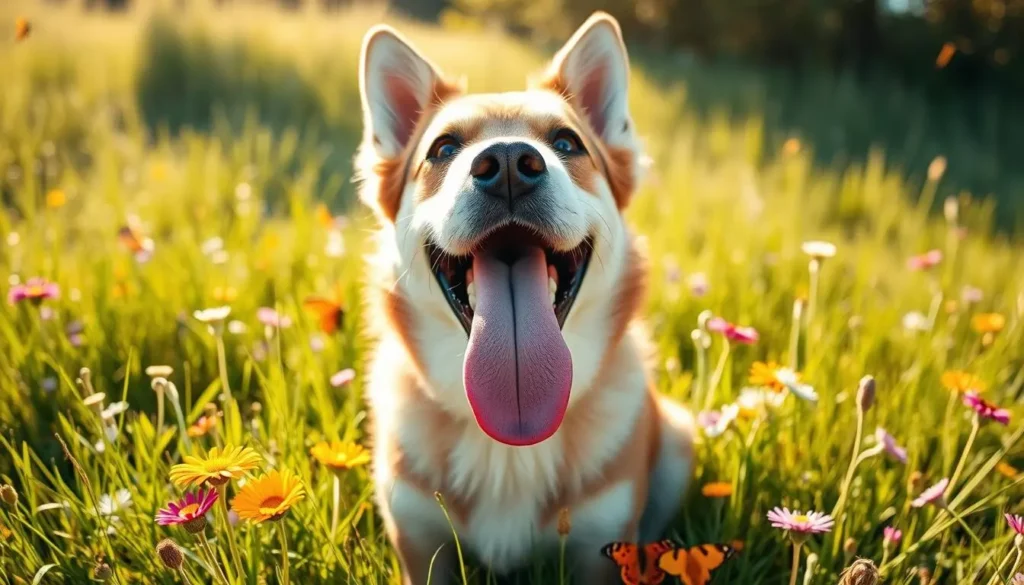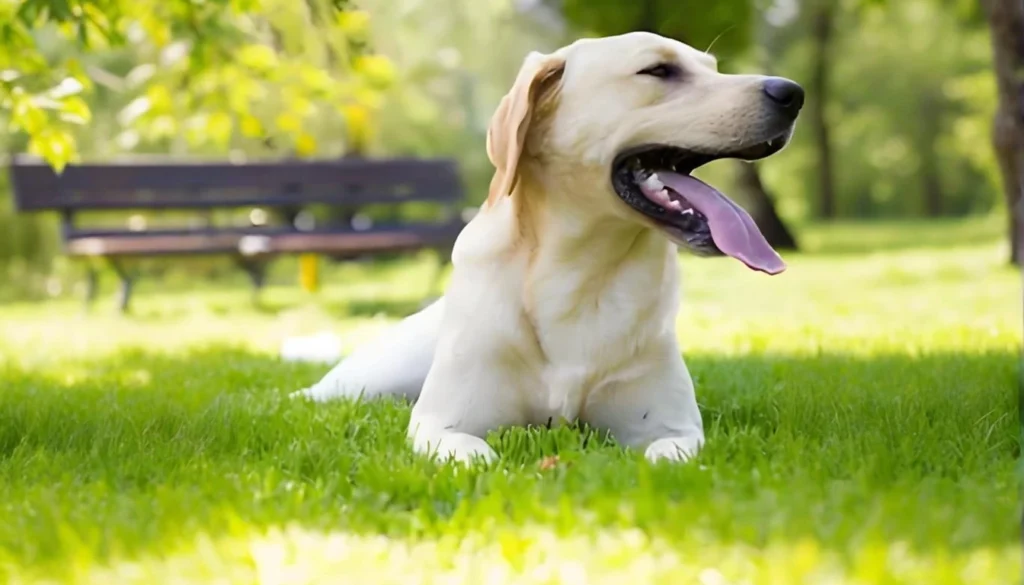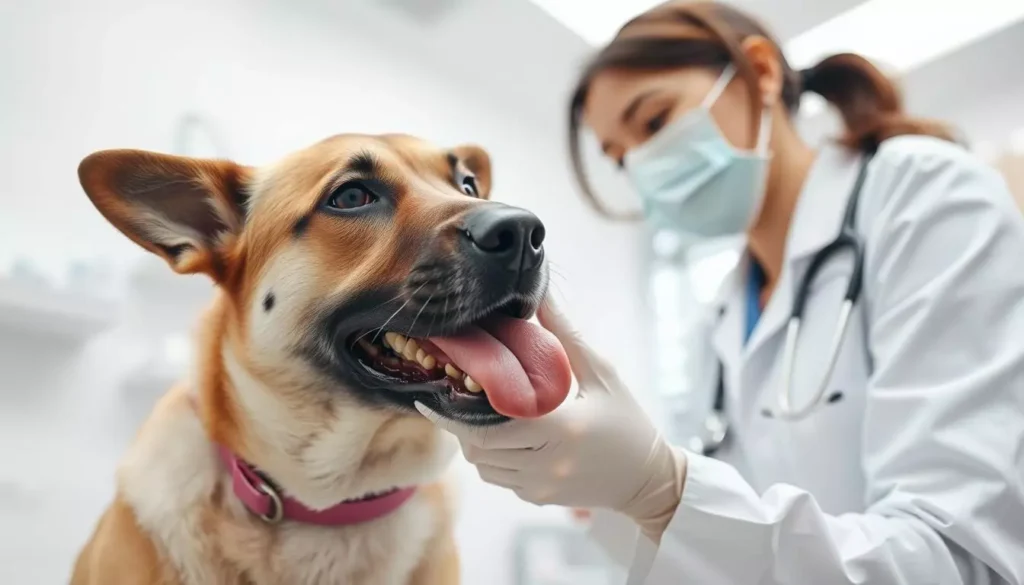As a dog owner, I love my furry friend's quirky habits. One of the most charming is when my dog keeps his tongue out. It makes me wonder, why does my dog always have his tongue out? It's a sweet sight, but sometimes it makes me worry about their health.
Watching my pup with his tongue out brings joy and curiosity. This behavior can show happiness, relaxation, or even health issues. Let's dive into why dogs stick their tongues out and what it means.
Key Takeaways
- Dogs often stick their tongues out as a sign of comfort and happiness.
- Understanding why my dog keeps his tongue out involves observing his behavior and environment.
- This behavior may have various causes, from relaxation to health concerns.
- Keeping an eye on changes in my dog's tongue behavior can ensure their well-being.
- Consulting a veterinarian is crucial if the behavior seems abnormal or concerning.
Understanding Dog Behavior
Understanding dog behavior is key for any pet owner. Dogs communicate in many ways, and noticing these signals can tell us a lot. For example, when they stick their tongues out, it can mean different things.
Knowing what your dog does is the first step to understanding them. When their tongue hangs out, it might show they're relaxed, happy, or trying to cool down. This knowledge helps owners take care of their pets better.
Watching my dog's body language helps me understand him better. Every wag of his tail, ear twitch, and tongue position has its own message. By paying attention to these signs, I can meet his needs better, making our bond stronger.
Common Reasons Why Dogs Stick Their Tongues Out
Dogs often show behaviors that are both interesting and funny. One common habit is sticking their tongues out. There are several reasons for this, and knowing them helps us bond with our pets.
One main reason is relaxation. When dogs are happy and calm, they might stick their tongues out. It shows they're enjoying the moment or taking a break after playing.
Another reason is thirst. Dogs use their tongues to cool down, especially after they've been active. If their tongue is out, they might need a drink of water. Keeping them hydrated is key.
Environmental factors also influence this behavior. Hot weather makes dogs pant, causing their tongues to hang out. Excitement or stimulation can also make them stick their tongues out, showing they're ready for fun.
Emotions also play a part. A relaxed dog might stick out their tongue as a sign of trust and joy. An anxious dog might do the same when feeling stressed or unsure. Understanding these signs helps me meet their emotional needs.
The Role of Happiness in Dogs
Understanding a dog's happiness is key to reading their behavior. This includes when they stick their tongues out. When I watch my dog, I look for signs of happiness. These signs tell me a lot about how my pup feels.
Signs of a Happy Dog
- Wagging tails that move vigorously back and forth
- Relaxed ears that hang naturally
- A soft mouth with a slightly open jaw
- Playful gestures, such as bowing or jumping
- Enjoying belly rubs and seeking affection
Interpreting Your Dog’s Mood
It's important to know what our dogs are feeling. A tongue out often means they're happy or content, not upset. By noticing these signs, I make sure my dog feels safe and loved.

Seeing his tongue out makes me feel good. It shows he's enjoying life. This connection helps us care for our dogs better by listening to their signals.
Relaxation: A Common Cause
Dogs often sleep with their tongues hanging out, which is quite cute. It shows they are really relaxed. Seeing my dog like this makes me feel good, knowing he's safe and happy.
There are many reasons why dogs relax this way. A dog that gets enough exercise will often sleep deeply. This can cause them to let their tongue hang out. It helps them cool down and shows they are happy and content.
Sleeping with Tongue Out
Seeing a dog sleep with its tongue out is normal and shows they are relaxed. It's like some humans who sleep with their mouths open. It's a sign of comfort and happiness for my dog. This is especially true in warm weather when they need to cool down.
Cooling Down: The Importance of Panting
Panting is a natural and essential behavior in dogs. When I see my dog breathing heavily and sticking out his tongue, I know he's cooling down. This is his way of regulating his body temperature.
This behavior is crucial, especially on hot days or after he's been active. Dogs don't have sweat glands all over their bodies like humans do. So, they pant to cool down. They do this by evaporating moisture from their tongues and lungs.
It's amazing to see how dogs cool down through panting. It shows how well they adapt to changes in their environment.
To help my furry friend, I make sure he has fresh water and shade when it's warm. Keeping him hydrated is key to keeping him cool. Creating a cool space for him makes our outdoor time together more enjoyable.
Genetic Traits That Influence Tongue Behavior
Genetic traits in dogs can explain why some dogs often show their tongues. Brachycephalic dogs, like Bulldogs and Pugs, are especially prone to this. Their unique mouth shape makes it hard for them to keep their tongues in, leading to a cute but worrying habit.
Brachycephalic Breeds
Brachycephalic breeds have physical traits that affect their tongue behavior. Their short skulls and wide heads mean less room for their tongues. This makes it hard for them to hide their tongues, leading to a charming but concerning habit.
Because of their anatomy, these dogs face health risks. Owners need to watch them closely to prevent problems. This is especially true for respiratory and dental issues.
Inheriting Them
Dog inheritance is key in tongue behavior. Puppies from brachycephalic parents are more likely to have similar traits. It's amazing how genetics can shape a dog's daily habits, including tongue behavior.
It's crucial to take care of these breeds. Regular health checks are essential due to their genetic predispositions.
Stress and Anxiety Symptoms
It's important to know the signs of dog anxiety to care for our pets well. Dogs show stress in different ways. Seeing them stick their tongue out and shake can mean they're feeling stressed or anxious.
Too much stress can cause physical and emotional problems. Dogs might pace, shake a lot, or show other nervous signs. Knowing these signs helps us figure out what's bothering our pets, like loud noises or being left alone.
When Your Dog Sticks Their Tongue Out and Shakes
This behavior might not just be a funny quirk. It could mean your dog is stressed. If your dog sticks out its tongue and shakes, watch how they act and what's around them. Here are some common signs to look for:
- Pacing and restlessness
- Excessive panting
- Refusal to eat
- Withdrawal from play and attention
- Vocalization or barking more than usual
| Behavior | Possible Cause |
|---|---|
| Sticking tongue out | Stress and anxiety |
| Shaking | Fear or discomfort |
| Pacing | Frustration or nervousness |
| Excessive panting | Heat or anxiety |
By knowing these signs of dog anxiety, we can make a better home for our dogs. This helps them feel better and live happier lives.
Tasting the Air: The Flehmen Response
The world of dog tasting is full of surprises. Dogs use their tongues to sniff out scents around them. This is more than just smelling; it's a way for them to explore and understand their world.
Watching my dog do the Flehmen response is like seeing him enjoy the air. He's not just smelling; he's tasting the scents around him. Dogs have a special organ that lets them pick up on smells better than humans can.
How Dogs Use Their Tongues to Explore
Dogs stick out their tongues to catch the air. This lets them taste the scents and pheromones around them. It's a way for them to learn about other animals, their territory, and even potential friends.
This behavior is key for dogs to interact and navigate their world. Whether they're looking for food or trying to understand other dogs, the Flehmen response is crucial.
| Aspect | Description |
|---|---|
| Behavior Name | Flehmen response |
| Purpose | Exploring scents |
| Mechanism | Using tongues to taste the air |
| Key Benefits | Enhanced understanding of the environment, social interaction |
| Associated Anatomy | Vomeronasal organ |
Dental Issues That May Cause Tongue Sticking
Dental problems in dogs can really affect their behavior. Issues like gum disease, loose teeth, or tooth decay cause discomfort. This makes a dog more likely to let their tongue hang out.
Preventing dental problems is key to keeping our furry friends happy and healthy. Regular dental check-ups can spot problems early. Signs like excessive drooling, trouble chewing, or bad breath might mean there's an issue.

Keeping up with dental care at home is important. Brushing your dog's teeth and giving them dental chews helps fight plaque. Knowing how dental issues affect behavior helps us care for our pets better.
Signs of Serious Health Problems
It can be worrying when my dog sticks out his tongue a lot. While many reasons are not serious, it's key to watch for signs of serious health issues. Changes in my dog's behavior or health can tell me a lot about his well-being.
Oral Tumors and Other Growths
Oral growths in dogs can show up as lumps or bumps in the mouth. They often mean there's a bigger problem. Look out for signs like pain when eating or grooming, unusual bleeding, or trouble swallowing.
These symptoms might mean oral tumors, which need vet care right away. Regular dental checks can catch these issues early.
Neurological Issues
Neurological problems in dogs can show up as odd behaviors, like being disoriented or having seizures. If my dog acts strangely, like stumbling or not following commands, it could be serious. Seeing unusual tongue movements or a lot of drooling with these signs means it's time to see the vet.
Why Does My Dog Always Have His Tongue Out?
Understanding why my dog's tongue is always out is key to better care and bonding. It's important to look at the context of their tongue behavior. Not every time their tongue is out means there's a problem.
By watching when my dog shows this behavior, I can spot patterns. These patterns might show if he's comfortable, stressed, or if there's a health issue.
Assessing the Context of Their Behavior
Several factors play a role when my dog's tongue is out. I need to consider his environment, mood, and how he interacts. This helps me understand his health better.
For instance, if his tongue is out while playing or resting, it means different things. A calm moment might show he's relaxed. But if it's out too much without reason, it's a sign to check on.
Watching my dog closely helps me check his health fully. If I see sudden changes or odd patterns, I should talk to a vet. Knowing why my dog acts a certain way helps me keep him happy and healthy.
Preventative Measures for Tongue-Related Issues
Keeping my dog's tongue healthy is key to their happiness. I use several steps to stop tongue problems. Regular dental care is crucial; brushing their teeth a few times a week helps avoid plaque. I also give them dental chews and toys to boost their oral health.
Regular vet visits are also essential. These check-ups help catch health issues early. I watch the weather too, making sure it's not too hot or stressful for my dog. This keeps their tongue safe from stress.
Here's a table with the main points for keeping a dog's tongue healthy:
| Preventative Measure | Description | Benefits |
|---|---|---|
| Dental Hygiene | Regular brushing and dental chews. | Reduces plaque and bacteria, promoting tongue health. |
| Veterinary Visits | Annual or biannual check-ups. | Early detection of dental or health issues. |
| Stress Management | Monitoring environmental stressors. | Helps maintain a calm demeanor, preventing tongue issues. |

Veterinary Check-ups: Keeping Your Dog Healthy
Regular vet visits are key to keeping dogs healthy. These visits do more than just give shots. They also check how well your dog is doing overall. Catching health problems early means your dog can stay happy and healthy.
I always make sure to take my dog to the vet regularly. Vets do a full check-up, talk about food and exercise, and might suggest tests. This way, any issues can be caught and fixed before they get worse. It makes me feel good knowing my dog is in good hands.
Monitoring Your Dog’s Behavior
Watching my dog's behavior is key to keeping them healthy and happy. I've learned that paying close attention can help spot any changes, especially with their tongue. If their tongue behavior changes, it might mean they're not feeling well.
When I watch my dog's tongue, I look at a few things:
- Frequency: How often does my dog stick out their tongue? Knowing what's normal helps me see when something's off.
- Appearance: Is the tongue its usual color? If it's not, or if it's swollen, I need to call the vet.
- Context: When does this happen? Is it when they're playing, relaxing, or in other situations?
Using these tips helps me catch any signs that my dog might not be okay. Keeping a log of these observations is also important. It helps me talk to my vet about any worries I have.
Common Misconceptions About Dogs and Their Tongues
As a dog owner, I've heard many myths about dogs that confuse us about their tongue behavior. One big dog tongue misconception is that dogs only stick their tongues out when they're hot or tired. But, it's not just about panting. Dogs might also stick out their tongues when they're relaxed or feeling happy.
Another common myth is that dogs with tongues hanging out are sick or have dental problems. But, the truth is, some dogs, especially certain breeds, naturally have their tongues out. These dogs are just showing off their unique genetic traits, not any health issues.
Knowing these myths about dogs helps us care for them better. Here's a table that clears up some common misconceptions:
| Myth | Truth |
|---|---|
| Dogs only stick their tongues out when hot. | They may also do it when relaxed or happy. |
| A dog with a hanging tongue is unhealthy. | Many breeds naturally have this trait without health issues. |
| Sticking tongue out is a sign of a behavior problem. | It often indicates curiosity or comfort. |
| Excessive drooling means trouble. | This can vary widely by breed and should be monitored. |
By learning about these dog tongue misconceptions, I can better understand my dog. This helps me make sure they're happy and healthy.
Understanding and Managing Hanging Tongue Syndrome
Hanging tongue syndrome is a big worry for some dog breeds, like Bulldogs and Pugs. It happens when a dog can't pull its tongue back in. This leads to tongue problems. To keep your dog healthy, you need to know why this happens and how to fix it.
Keeping your dog's mouth clean is a good start. Brushing their teeth often stops dental issues that make tongue problems worse. Also, make sure your dog always has fresh water. This helps keep them hydrated and can ease some symptoms.
There are different ways to help your dog, like training or special mouth tools. Sometimes, a vet's help is needed. It's important to work with a vet who knows about hanging tongue syndrome. They can give you the best advice and check on your dog's health.
Conclusion
Exploring dog tongue behavior has shown me many interesting reasons why dogs stick their tongues out. It could be happiness, cooling down, or genetic traits. Each reason tells us about their health and happiness.
It's key to watch and understand these signs. They help us bond better with our pets. This summary shows how important it is to notice and interpret these behaviors.
Also, keeping an eye on dog health is vital. Regular vet visits and watching for changes can stop health problems. Knowing when they're happy or uncomfortable helps us care for them better.
Finally, learning more about dog care is always important. The more I know about my dog's tongue behavior, the better I can care for them. Let's keep learning and caring for our pets together.




